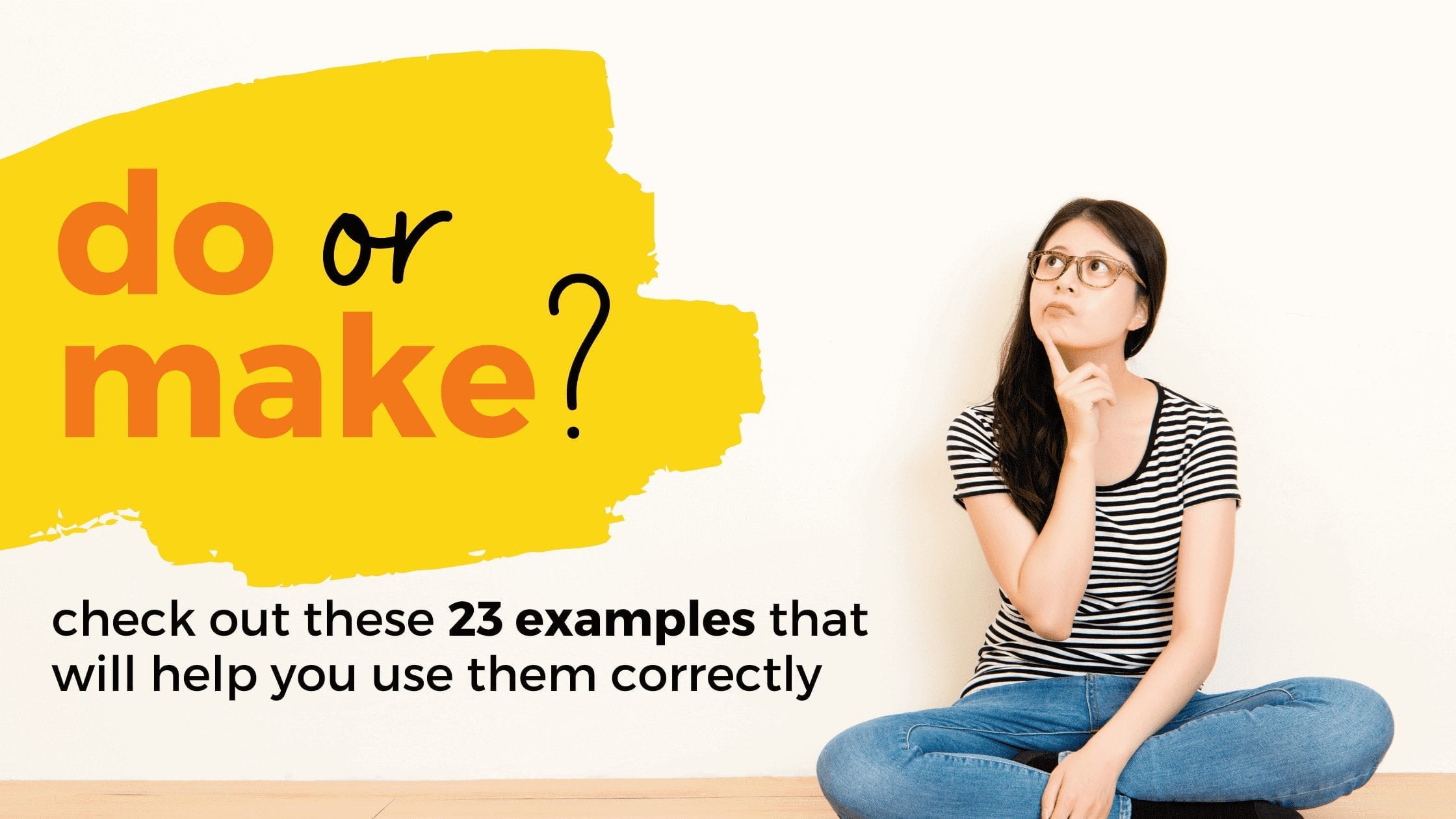Make or Do? 7 Tips to Learn the Differences Between These Verbs
How many times have you found yourself wondering if you should use do or make in a sentence? It’s not an uncommon question, so that’s why we’re tackling this issue in this article. Let’s learn how to use the English do and make verbs and also explain the difference between them. You’ll also find a list of collocations with make and do at the end of this post.
Before getting too far into this list, remember that both of these verbs are irregular verbs which means the other forms (V1, V2, V3) have different spellings.
| Base (V1) | Past (V2) | Past participle (V3) |
| do | did | done |
| make | made | made |
Differences between make and do
If you don’t take time to study this topic a little, you’ll probably find yourself making small mistakes when you use these verbs. Don’t let that happen! Study this a little, and then follow our examples to practice them more. One way is to try writing sentences in which you use the two verbs in different situations. Let’s understand more about make or do.
Do: work, jobs, and tasks
If you are talking about work, jobs, and tasks, you will probably collocate those words with the verb do. Here are some examples:
- Do the housework (like laundry, the dishes, the ironing)
- I hate doing laundry! Would you mind doing it?
- I’ll do the dishes!
Exception: even though it is a task, we say “make the bed”
I always make my bed in the morning.
- Do the homework
- I can’t go out tonight. I have so much homework to do.
- Do a good job
- You did such a good job with this presentation!
Do: non-specific activities
If you are talking about a non-specific activity, you will probably collocate those words with the verb do. Here are some examples:
- What are you doing tonight?
Honestly, I have nothing to do.
- Can you create some slides for our presentation?
Sure thing, I can do everything.
- Do you want to do anything tomorrow?
Yes! Actually, there’s a new restaurant downtown. Would you like to go there?
Make: food and drink
If you are talking about food and drink, you will probably collocate those words with the verb make. Here are some examples:
- What are we eating tonight?
I was thinking of making spaghetti and meatballs. How does that sound to you?
- Do you drink?
Yes. I am not a big fan of beer, but I make an amazing mojito.
- I usually don’t have time to make my breakfast on Friday mornings.
Make: the origin of something or a product material

If you are talking about the origin of something or a product material, you will probably collocate those words with the verb make. Here are some examples:
- The ring he gave me is made of gold.
- This carpet was made in Turkey. Isn’t it beautiful?
- Wow, I love this painting! Where did you buy it?
Oh, I made it! I’m glad you liked it.
Use ‘make’ with phrases related to producing a reaction
If you are talking about producing a reaction, you will probably collocate those words with the verb make. Here are some examples:
- Turn up the volume! This song makes me so happy.
- You look sad. What happened?
Oh, my sister said something earlier today that made me sad.
- Your message made me smile.
Make: plans and decisions
If you are talking about plans and decisions, you will probably collocate those words with the verb make. Here are some examples:
- I’m not sure about which computer to buy. I have to make a decision soon because mine is broken.
- Do you make plans and find it difficult to continue with them?
- Since the hotel was full, we had to make other arrangements.
Make: speaking and sounds

If you are talking about speaking and sounds, you will probably collocate those words with the verb make. Here are some examples:
- My neighbors are always making noises late at night.
- I don’t like when people make comments about my looks.
- Can I make a suggestion? Move the sofa to the other wall, you will have more space then.
Make and do list of collocations
Let’s face it, sometimes we just have to see a list of expressions with make and do in order to really get it. So here it is! While you shouldn’t try to memorize all of these at once, it is a good idea to read them aloud and start learning the phrases with do and make. By doing that, you are more likely to get it right every time.
Here are a few examples of common collocations with do:
| do well | do your best | do business |
| do exercises | do research | do a course |
| do your hair | do your nails | do the right thing |
Here are some examples of everyday collocations with make:
| make (a cup of) coffee | make breakfast / lunch / dinner | make a reservation |
| make money | make friends | make fun of someone |
| make a phone call | make a joke | make a mess |
| make a complaint | make a speech | make an excuse |
| make a mistake | make an exception | make a comment |
We hope these sentences and collocations help you learn the difference between make and do.
Both verbs are used frequently in English and understanding the difference between them will make you life as an ESL student much easier. Did we miss something? Comment below with your questions about make or do, and we’ll explain the differences between these English verbs! Read more about confusing words in English.
Happy studying!

